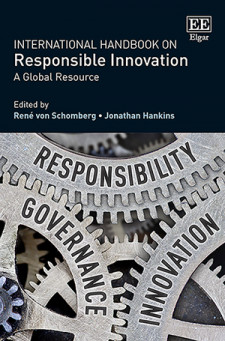
As you may see from the cover, I have a book newly released and would like to invite all readers (who can) to join me in Manchester to launch it.
The event opens with two keynote addresses, the first from from Rene von Schomberg and the second from myself, Jonathan Hankins. A Series of short panel presentations follow with an open discussion involving panel members, speakers and audience. Wine and nibbles reception to close.
INVITATION
You are all very welcome to join us on Wednesday 27 November 2019 at Manchester Metropolitan University Business School, (Rm BS125) to launch and discuss the new:
International Handbook on Responsible Innovation: A Global Resource
Edited by René von Schomberg, Directorate General for Research and Innovation, European Commission, Belgium and Guest Professor, Technical University Darmstadt, Germany and Jonathan Hankins, The Bassetti Foundation, Italy.
The Handbook constitutes a global resource for the fast growing interdisciplinary research and policy communities addressing the challenge of driving innovation towards socially desirable outcomes. This book brings together well-known authors from the US, Europe and Asia who develop conceptual and regional perspectives on responsible innovation as well as exploring the prospects for further implementation of responsible innovation in emerging technological practices ranging from agriculture and medicine, to nanotechnology and robotics. The emphasis is on the socio-economic and normative dimensions of innovation including issues of social risk and sustainability.
Full reference:
Schomberg, R & Hankins, J. eds International Handbook on Responsible Innovation : A Global Resource,’ Cheltenham UK and Northampton USA: Edward Elgar . ISBN 978 1 78471 88 5
AGENDA
3pm Arrival & Coffee
3.15 Introduction & Welcome
3:20 Keynote – René von Schomberg
3:45 Keynote – Jonathan Hankins
4pm Panel Presentations and Open Discussion
5pm Wine reception
6pm close
This is a free event. All are welcome. Please register and claim your ticket here
Readers who have been following the series on Responsible Innovation will know the name of Von Schomberg too, and there is much more to come on that front. This is one not to be missed if you are in the area.
The event is hosted by SEEG, Manchester Metropolitan University’s Sustainable and Ethical Enterprise Group, and MIOIR the Manchester Institute of Innovation Research based at the University of Manchester Alliance Business School. The links will take you to places of wonder, full of interesting browsing.

